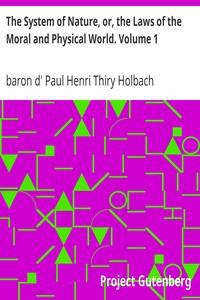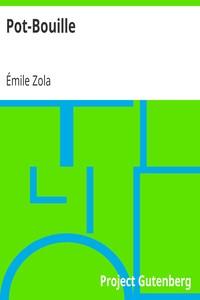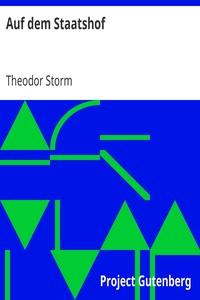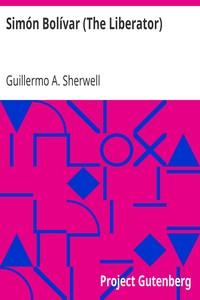Read this ebook for free! No credit card needed, absolutely nothing to pay.
Words: 122117 in 14 pages
This is an ebook sharing website. You can read the uploaded ebooks for free here. No credit cards needed, nothing to pay. If you want to own a digital copy of the ebook, or want to read offline with your favorite ebook-reader, then you can choose to buy and download the ebook.


: The System of Nature or the Laws of the Moral and Physical World. Volume 1 by Holbach Paul Henri Thiry Baron D - Philosophy and religion; Psychology; Materialism Atheism
PREFACE PART I--Laws of Nature.--Of man.--The faculties of the soul. --Doctrine of immortality.--On happiness.
The most important of our duties, then, is to seek means by which we may destroy delusions that can never do more than mislead us. The remedies for these evils must be sought for in Nature herself; it is only in the abundance of her resources, that we can rationally expect to find antidotes to the mischiefs brought upon us by an ill directed, by an overpowering enthusiasm. It is time these remedies were sought; it is time to look the evil boldly in the face, to examine its foundations, to scrutinize its superstructure: reason, with its faithful guide experience, must attack in their entrenchments those prejudices, to which the human race has but too long been the victim. For this purpose reason must be restored to its proper rank,--it must be rescued from the evil company with which it is associated. It has been too long degraded--too long neglected--cowardice has rendered it subservient to delirium, the slave to falsehood. It must no longer be held down by the massive claims of ignorant prejudice.
Truth is invariable--it is requisite to man--it can never harm him--his very necessities, sooner or later, make him sensible of this; oblige him to acknowledge it. Let us then discover it to mortals--let us exhibit its charms--let us shed it effulgence over the darkened road; it is the only mode by which man can become disgusted with that disgraceful superstition which leads him into error, and which but too often usurps his homage by treacherously covering itself with the mask of truth--its lustre can wound none but those enemies to the human race whose power is bottomed solely on the ignorance, on the darkness in which they have in almost every claimed contrived to involve the mind of man.
Truth speaks not to those perverse beings:--her voice can only be heard by generous souls accustomed to reflection, whose sensibilities make them lament the numberless calamities showered on the earth by political and religious tyranny--whose enlightened minds contemplate with horror the immensity, the ponderosity of that series of misfortunes which error has in all ages overwhelmed mankind.
Let us then endeavour to disperse those clouds of ignorance, those mists of darkness, which impede man on his journey, which obscure his progress, which prevent his marching through life with a firm, with a steady grip. Let us try to inspire him with courage--with respect for his reason--with an inextinguishable love for truth--with a remembrance of Gallileo--to the end that he may learn to know himself--to know his legitimate rights--that he may learn to consult his experience, and no longer be the dupe of an imagination led astray by authority--that he may renounce the prejudices of his childhood--that he may learn to found his morals on his nature, on his wants, on the real advantage of society--that he may dare to love himself--that he may learn to pursue his true happiness by promoting that of others--in short, that he may no longer occupy himself with reveries either useless or dangerous--that he may become a virtuous, a rational being, in which case he cannot fail to become happy.
If he must have his chimeras, let him at least learn to permit others to form theirs after their own fashion; since nothing can be more immaterial than the manner of men's thinking on subjects not accessible to reason, provided those thoughts be not suffered to embody themselves into actions injurious to others: above all, let him be fully persuaded that it is of the utmost importance to the inhabitants of this world to be JUST, KIND, and PEACEABLE.
Far from injuring the cause of virtue, an impartial examination of the principles of this work will shew that its object is to restore truth to its proper temple, to build up an altar whose foundations shall be consolidated by morality, reason, and justice: from this sacred pane, virtue guarded by truth, clothed with experience, shall shed forth her radiance on delighted mortals; whose homage flowing consecutively shall open to the world a new aera, by rendering general the belief that happiness, the true end of man's existence, can never be attained but BY PROMOTING THAT OF HIS FELLOW CREATURE.
MIRABAUD'S SYSTEM OF NATURE
LAWS OF NATURE--OF MAN--THE FACULTIES OF THE SOUL--DOCTRINE OF IMMORTALITY--ON HAPPINESS.
Man has always deceived himself when he abandoned experience to follow imaginary systems.--He is the work of nature.--He exists in Nature.--He is submitted to the laws of Nature.--He cannot deliver himself from them:--cannot step beyond them even in thought. It is in vain his mind would spring forward beyond the visible world: direful and imperious necessity ever compels his return--being formed by Nature, he is circumscribed by her laws; there exists nothing beyond the great whole of which he forms a part, of which he experiences the influence. The beings his fancy pictures as above nature, or distinguished from her, are always chimeras formed after that which he has already seen, but of which it is utterly impossible he should ever form any finished idea, either as to the place they occupy, or their manner of acting--for him there is not, there can be nothing out of that Nature which includes all beings.
Therefore, instead of seeking out of the world he inhabits for beings who can procure him a happiness denied to him by Nature, let him study this Nature, learn her laws, contemplate her energies, observe the immutable rules by which she acts.--Let him apply these discoveries to his own felicity, and submit in silence to her precepts, which nothing can alter.--Let him cheerfully consent to be ignorant of causes hid from him under the most impenetrable veil.--Let him yield to the decrees of a universal power, which can never be brought within his comprehension, nor ever emancipate him from those laws imposed on him by his essence.
Nature sends man naked and destitute into this world which is to be his abode: he quickly learns to cover his nakedness--to shelter himself from the inclemencies of the weather, first with artlessly constructed huts, and the skins of the beasts of the forest; by degrees he mends their appearance, renders them more convenient: he establishes manufactories to supply his immediate wants; he digs clay, gold, and other fossils from the bowels of the earth; converts them into bricks for his house, into vessels for his use, gradually improves their shape, and augments their beauty. To a being exalted above our terrestrial globe, man would not appear less subjected to the laws of Nature when naked in the forest painfully seeking his sustenance, than when living in civilized society surrounded with ease, or enriched with greater experience, plunged in luxury, where he every day invents a thousand new wants and discovers a thousand new modes of supplying them. All the steps taken by man to regulate his existence, ought only to be considered as a long succession of causes and effects, which are nothing more than the development of the first impulse given him by nature.
Free books android app tbrJar TBR JAR Read Free books online gutenberg
More posts by @FreeBooks

: The Ignatian Epistles Entirely Spurious: A Reply to the Right Rev. Dr. Lightfoot by Killen W D William Dool - Ignatius Saint Bishop of Antioch -approximately 110. Correspondence. Polyglot; Ignatius Saint Bishop of Antioch -approximately 110 Authorship; Lig


: Pot-Bouille by Zola Mile - Paris (France) Fiction; France History Second Empire 1852-1870 Fiction FR Littérature






